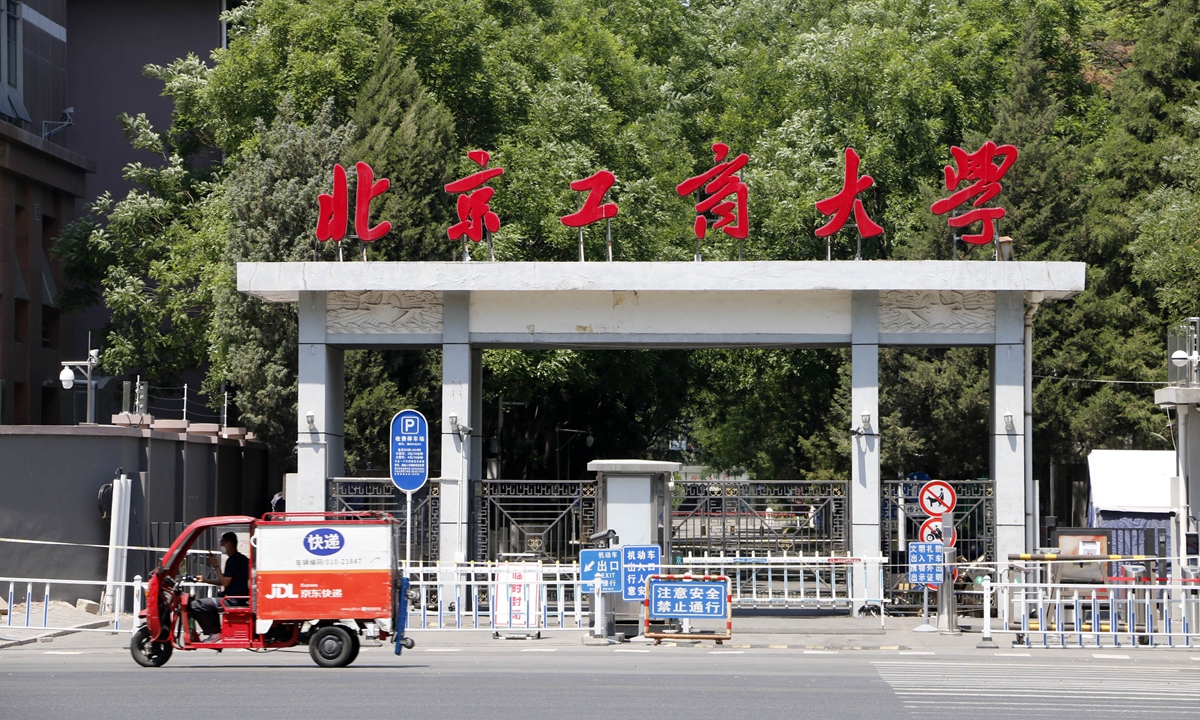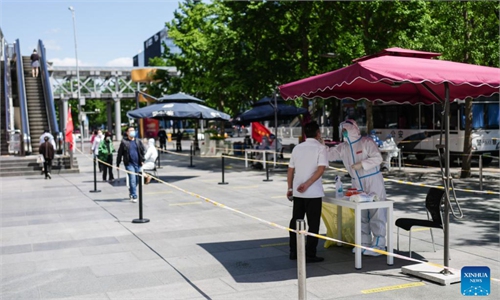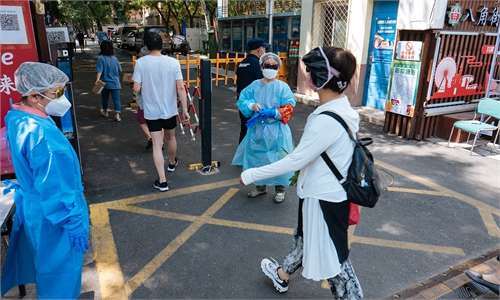Universities are focus of COVID-19 prevention, control efforts in Beijing
Outbreak could be curbed in 2 to 4 weeks: expert

The south gate of the east campus of Beijing Technology and Business University is temporarily closed in Haidian district, Beijing on May 21, 2022. Photo: VCG
Universities are currently the focus of COVID-19 prevention and control efforts in Beijing, the capital city's officials said on Sunday, after five schools in a university town were closed following cluster infections among teachers and students.
Lockdowns within these universities should be strictly implemented, with epidemic prevention measures put in place for every location and every person, the authorities said.
As of Saturday, 16 infections had been reported in the current round of the outbreak at a Fangshan campus of the Beijing Institute of Technology. All students and faculty at the campus were moved to a centralized isolation site. Subsequently, five universities in that university town in Fangshan district were closed.
Health authorities in Beijing called for strict prevention of the risk of spillover from the outbreak in the university town and services to safeguard the academic lives of quarantined students. Universities in Beijing will also tighten campus closures and strengthen student health monitoring and nucleic acid testing.
The fight against the Omicron outbreak in Beijing has entered its second month since domestically transmitted cases of COVID-19 were reported on April 22. As of Sunday, Beijing had reported nearly 1,500 cases in the latest round of the outbreak.
From 3 pm Saturday to 3 pm Sunday, Beijing reported a total of 94 domestically transmitted COVID-19 cases, bringing the total number of cases in the current outbreak to 1,493. The number of cases found in community screening has still not cleared. Of the 94 cases reported on Saturday, 17 were found during community-level screening.
Judging by the current situation, Beijing's epidemic can be curbed in about two to four weeks, but experts also warned of the possibility that the virus could co-exist with society for the entire summer.
A total of 16.25 million people were tested for nucleic acid in Beijing on Saturday, accounting for 82 percent of the city's residents. Of the mixed test samples collected, 10 tubes were positive on initial screening, officials said at a news conference on Sunday.
Five districts - Chaoyang, Fengtai, Fangshan, Haidian and Shunyi - in the city and suburbs have asked employees to work from home to the maximum extent possible since Monday as many districts have seen an increase in the number of infections.
Indoor establishments will be suspended for a week, except for supermarkets, vegetable stores, restaurants (take-out service only), hospitals and pharmacies, which guarantee basic livelihood needs.
While screening and prevention and control efforts continue, there are some areas that have started to lift the lockdown measures. On Sunday, some communities in Chaoyang and Tongzhou districts had their COVID-19 risk levels downgraded with no recent reported cases.
Experts said that although the outbreak in Beijing has not been fully contained a month after the outbreak, it has been kept at a low level.
"It is difficult to control infections quickly because Omicron causes mild symptoms, which is difficult to detect and spreads quickly," Wang Guangfa, a respiratory specialist in Beijing, told the Global Times, noting that the biggest problem is the difficulty in detecting cases early, so it is difficult to control insidious transmission.
Beijing's epidemic situation showed that "we have not been fully able to detect and control all infections at the community level, and some of them that were left out led to more viral spread. This suggests that the current massive nucleic acid tests are not enough to curb the Omicron outbreak in the city," a Beijing-based immunologist told the Global Times on Sunday.
The immunologist predicted that Beijing's epidemic can be curbed in about two to four weeks.
As the weather turns warmer, the virus degradation will quicken, making it even harder to detect, he said.
Experts suggested that more combined measures should be rolled out so as to precisely find potential transmission risks, including stricter crackdowns on concealment or deception in reports of cases.


